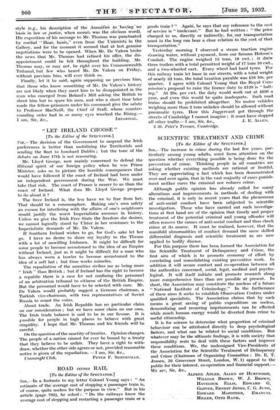"LET IRELAND CHOOSE"
[To the Editor of the SPECTATOR.] SIR,—The decision of the Government to suspend the Irish preferences is better than mobilizing the Territorials and sending the fleet to bombard Dublin ; but the tone of the debate on June 17th is not reassuring.
Mr. Lloyd George, now mainly concerned to defend the illiberal spirit of our foreign policy when he was Prime Minister, asks us to picture the horrible consequences that would have followed if the coast of Ireland had been under an independent government during the War. We must take that risk. The coast of France is nearer to us than the coast of Ireland. What does Mr. Lloyd George propose to do about it ?
The freer Ireland is, the less have we to fear from her. That should be a commonplace. Making one's own safety an excuse for interfering with the affairs of one's neighbours would justify the worst Imperialistic excesses in history. Unless we give the Irish Free State the freedom she desires, we cannot logically stand by Ulster in her resistance to the Imperialistic demands of Mr. De Valera.
If Southern Ireland wishes to go, for God's sake let her go. I have no desire to share my loyalty to the Throne with a lot of unwilling Irishmen. It might he difficult for some people to become accustomed to the idea of an Empire without Ireland, just as it might be difficult for a man who has always worn a bowler to become accustomed to the idea of a soft hat ; but time works miracles.
The repudiation of the annuities strikes me as being more Irish" than British ; but if Ireland has the right to become a republic there is a case for not confining the personnel of an arbitration tribunal to citizens of the British Empire. But the personnel would have to be selected with care. Mr. Be Valera would probably suggest a German chairman, a Turkish vice-chairman, with two representatives of Soviet Russia to count the votes.
About trade. An Irish Republic hat no particular claim on our consideration ; but we have some claim on our own. The Irish trade balance is said to be in our favour. It is possible for people in high places to behave with great stupidity. I hope that Mr. Thomas and his friends will be careful.
On the question of the sanctity of treaties. Opinion changes. The people of a nation cannot for ever be bound by a treaty that they believe to be unfair. They have a right to with- draw, whether the other side agrees or not, provided reasonable notice is given of the repudiation. —I am, Sir, &c.,


































 Previous page
Previous page